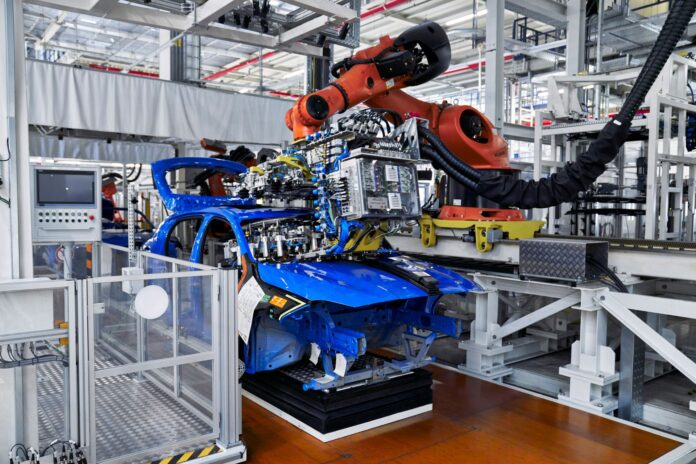Vodafone Germany has been busy with private networks for Industry 4.0. A new announcement, with Nokia, says the pair are testing high-accuracy indoor positioning (HAIP) services over a 5G ‘campus network’ (‘campus-netz’) at BMW’s factory in Leipzig, the car maker’s premier site for testing new edge 5G and AI capabilities. The technology is being used to locate machines, tools, cars, and spare parts at the site – with centimetre-level accuracy, in theory.
Meanwhile, Vodafone has separately announced a project with Nokia and local system integrator Smart Mobile Labs to bundle a private 5G edge system into a “compact car transport trailer”, for the construction industry (link) to deploy and redeploy temporary connectivity at building sites. It has also deployed a private 5G network for pharmaceutical firm Bayer (link), to cover an 11,000 square-metre “greenhouse” research facility in Monheim in North Rhine-Westphalia.
These recent announcements follow deals earlier in the year with the University Medical Center Schleswig-Holstein (UKSH) in Kiel (link), on the Baltic Sea coast, to establish a private 5G testbed to develop various IoT and AI diagnostic solutions for remote healthcare monitoring, and with BASF (link) to run a 12-month private 5G testbed at the German chemical company’s production site in Lausitz, between Germany and Poland.
The new HAIP test project with BMW is intended to increase automation and quality of production at the German car maker’s Leipzig plant. It is focused specifically on two areas, measuring around 4,500 square metres, in the assembly hall and in the logistics centre, said Vodafone. BMW’s Leipzig plant is home to 5,300 employees and produces around 1,000 vehicles per day.
As of a couple of years back, Deutsche Telekom had installed a dual-slice private LTE ‘campus network’, hived off its public LTE network, at the site, with Ericsson in tow for the networking gear. It has various projects with various providers, across other factories. In July, it announced a €600,000 private 5G system at a training centre in Dingolfing, in Bavaria, with NTT providing support. Dingolfing is the firm’s other major smart factory accelerator site.
A statement from Vodafone Germany said: “For the first time, a new type of high-precision 5G positioning system is being used under live conditions… 5G positioning… could become the most important positioning system for centimetre-precise positioning in the future. Positions are calculated in real time using time and angle-based measurements… [so] every object… can be located with high precision, even in indoor systems.
It added: “In the pilot project… driverless transport vehicles [carrying] pallets with car parts and high-quality tools will be equipped with 5G technology. But the positioning technology also promises increased safety and ergonomics in everyday work for factory workers in the future.”
Alexander Saul, managing director for corporate customers at Vodafone Germany, commented: “With 5G, the degree of digitization in the automotive industry will continue to increase. Real-time location technologies will play a key role in the ‘smart factories’ of the future. They can be used to precisely localise networked materials, tools, machines and vehicles. In the next step, they will then also be able to interact with their environment in real time via 5G networks.”
Martin Beltrop, head of enterprise portfolio management at Nokia, said: “The pilot will help to refine the technology in practical use. In the industrial environment, the exact location of objects is challenging due to different environments… 5G antennas must be precisely aligned. We will use these findings to further develop the technology and to commercialise it in future 5G campus networks and future industrial devices.”

